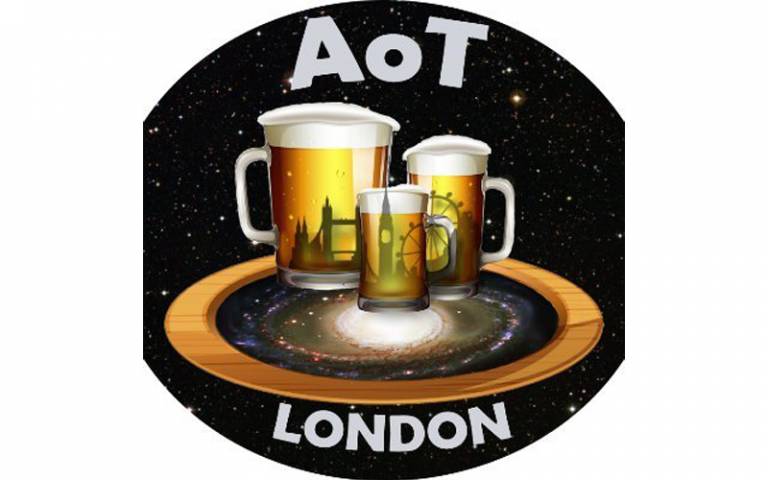Astronomy on Tap: Celebrating Women Astronomers
3 February 2021
Susan Pyne celebrates three pioneering women astronomers in a talk for Astronomy on Tap, London.

Astronomy on Tap (AoT) was originally started in New York City to offer a fun and relaxed environment for scientists, educators, writers and artists to share their work with the general public, in the social setting of a bar. In 2020, AoT was brought to London by UCL Research Fellows Corentin Cadiou and Chiara Circosta (Astrophysics Outreach Coordinator) and PhD student Romain Meyer. At the most recent event, Honorary Research Fellow Susan Pyne gave a talk on ‘Celebrating Women Astronomers’.
Q. Corentin, how did you get involved in AoT, what do you enjoy about it, and what are the benefits for the audience?
I participated in a few outreach events during my PhD in France. In particular, I had the chance to present some of my work at the "Pint of science festival" which brings together scientists and the general public within the social setting of a pub. When I arrived in London, I was surprised not to find anything similar here, so we decided to launch our very own satellite of "Astronomy on Tap London".
I think that now more than ever it is essential for scientists to reach out to the general public to share what we know. Outreach events like AoT allow us to connect with the public in a very interactive manner, and since astronomy is quite popular we have the chance of being able to attract many people.
I find it rewarding to see people's interest in astronomy and astrophysics and to see scientists be interested in sharing their work. I hope that our events reconcile in people's mind the idea that science can be fun, serious and breath-taking at the same time but most importantly that you do not need to have a PhD to enjoy it. It is very rewarding to see that our events have now been seen by more than 3,000 people and our schedule is full till the end of March!
We were really happy to have Susan's talk celebrating women astronomers. The stories she narrated show just how unequal the system was (and still is) for women in astronomy and in science in general, and allow us to reflect on the past and see what is being done to achieve to reduce gender inequalities. Her presentation contributed to deconstructing the idea that science is only the work of white males like me, and I hope this message will be heard!
Q. Susan, what was the inspiration for your talk?
In a previous AoT talk the speaker commented that astronomy still isn’t very diverse and was even less so in the past. This is true, but in fact some really fundamental astronomical discoveries were made by women. Often, they weren’t given enough credit for what they achieved so I wanted to redress the balance.
"When one thinks of a famous astronomer of the past, chances are that one will come up with someone white and male”.
Q. What do you believe the biggest impediment was to women wanting to work in the field of astronomy?
I think it was just the prevailing attitude of society that women couldn’t or shouldn’t do serious work – their role was to look after their husband, family and home. It is sad to think of all the highly intelligent and often well-educated women who were denied the opportunity to make a wider contribution. Of course, this didn’t just apply to astronomy.
Q. Which female astronomer was the greatest inspiration to you, and why?
Jocelyn Bell Burnell is a great inspiration. I can empathise with the story of her as a young PhD student in a male world when she helped to make the ground-breaking discovery of pulsars. It has often been said that as a woman she didn’t get the recognition she deserved, but I admire how she built on the experience gracefully and went on to become a scientific leader and role model, notably promoting more diversity in physics. In 2018 she was awarded the Breakthrough Prize in Fundamental Physics and donated the entire £2.3 million award to a scholarship fund to help doctoral students from groups which are under-represented in physics.
Q. Towards the end of your talk, you mention the prestigious Royal Astronomical Society 2021 awards made to Jocelyn Bell Burnell and to Hiranya Peiris; what further awards would you like to see made in the future that acknowledge the accomplishments of female astronomers?
I would like to see a future which is completely gender-blind so the ‘story’ is about the science, not the characteristics of the recipient. In the USA there is a prestigious award, the Annie Jump Cannon Award in Astronomy, for a promising female early-career researcher. Many talented female astronomers have accepted this prize but I admire one of the women I focused on in my talk, Margaret Burbidge, who refused to accept this women-only award. The Royal Astronomical Society awards to Jocelyn Bell Burnell and Hiranya Peiris show that astronomy is already making progress towards this future vision.
Links
Susan’s AoT talk: Celebrating Women Astronomers
The 2021 Royal Astronomical Society Awards
Watch all AoT London presentations to date here
More about Corentin Cadiou, Chiara Circosta , Susan Pyne
 Close
Close

